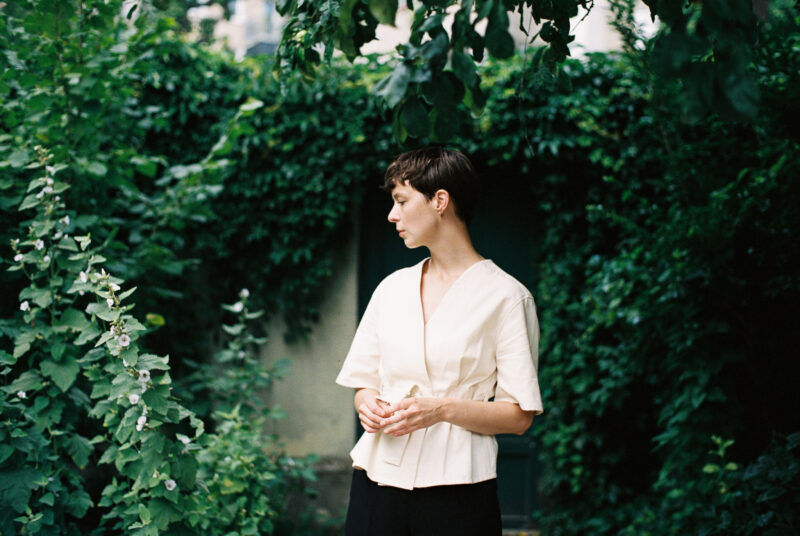A place without wind, a momentary corner of peace and quiet amidst the raging storms. You can hear the winds blow past, but you are tucked away in a safe space, a musical seclusion from the stress of the outside world. That is what LUWTEN’s music feels like. The name literally means “a place without wind” in the artist’s native tongue Dutch. Tessa Douwstra is the musician and producer hiding behind the mood-setting moniker. The project originated in Amsterdam and the 2017 self-titled debut is now finally followed by her sophomore record Draft released earlier this year.
The album title is a hint at the wind theme as well. The music is a tender draft that floods into the room underneath the doorstep. Likewise, the gentle instrumentation and the ethereal vocals of the singer nudge their way into the listener’s heart. The fresh breeze from Amsterdam carries a whiff of electronic and singer songwriter influences and is led by the loose vocal performance of Tessa.
At the Green Oasis
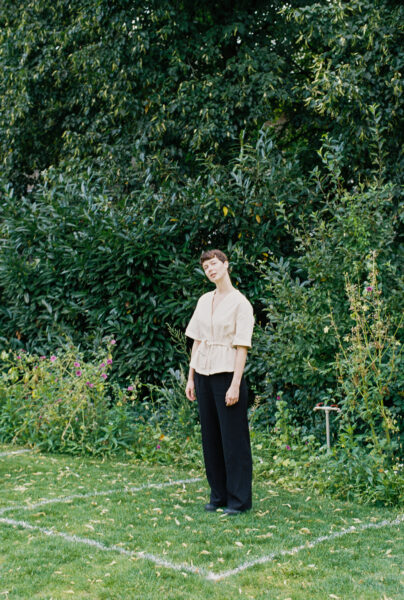 The music develops organically. So, the momentary impossibility of playing smoky basement concerts actually benefitted the setting of the show the band played in Berlin in August. Set in the garden of the Silent Green quartier – a small oasis of green and silence amidst a busy neighborhood – the artist graced the stage with her band. Adhering to the covid guidelines, the concert was held in picnic setting, meaning that the audience was spread out in assigned spots on the grass in front of the stage and each attendee received a pair of quality headphones to listen to the music performed on stage. Before the show, I met the artist in person to chat about her musical philosophy and approach to songwriting.
The music develops organically. So, the momentary impossibility of playing smoky basement concerts actually benefitted the setting of the show the band played in Berlin in August. Set in the garden of the Silent Green quartier – a small oasis of green and silence amidst a busy neighborhood – the artist graced the stage with her band. Adhering to the covid guidelines, the concert was held in picnic setting, meaning that the audience was spread out in assigned spots on the grass in front of the stage and each attendee received a pair of quality headphones to listen to the music performed on stage. Before the show, I met the artist in person to chat about her musical philosophy and approach to songwriting.
Tessa Douwstra is wearing her hair in a short pixie cut, highlighting her attentive gaze and warm smile. Like her music, the artist radiates a balanced and quietly confident energy. But even though the music she releases is crafted with the security of a trained musician, the artist loves questioning, reworking, and accepting the unfinished state of anything creative. It just makes sense that she recently took a philosophy course.
“I found out there’s a whole bunch of people who like looking at things from many perspectives. Who enjoy to formulate and discuss those perspectives without all of them having to be some kind of truth.”
Solitude and Loneliness
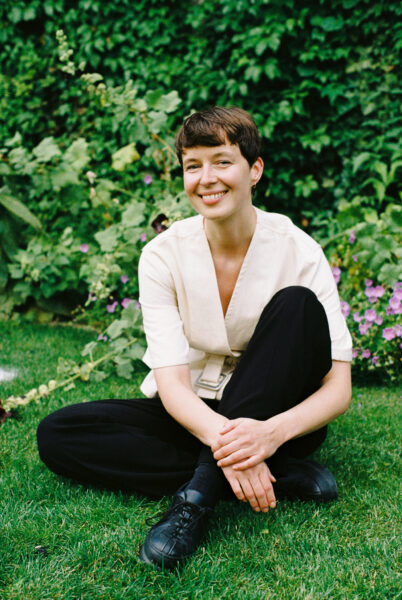
Each of the songs on the record has its own philosophical problem or emotion it is dealing with. LUWTEN takes different perspectives on issues like agency, control, and freedom, examining them from various angles and leaving room for growth.
Draft, the song, describes the way from wanting to be alone to longing for the other person to come home. Do you observe that process in yourself? How does your sense of space change in those two emotions? Me, for example, when I am alone at home and I want to be alone the space feels infinite, I love my room and the flat. But when I do not want to be alone the walls become a confinement. I start hating everything about my environment. My emotions transform the way I live and the way I perceive and inhabit space. What kind of experiences have you made with that? And does the way you inhabit creative spaces also change according to the emotion?
“When I’m longing for solitude, I feel at ease in every space. I’m fine living inside my head and a lot of times can’t be bothered where I am. When that solitude starts to transform and turn into loneliness is when I really need to get out of the house for sure.”
I like the analogy you make between sleeveless and sleepless. They are two states that are personally revealing in different ways, I feel. Do you agree that they both have a similar revealing quality? What are the similarities and differences you feel?
“In the song I talk about a thief trying to break in in a sleepless night which has no use because everyone will see the thief arrive. In that way they’re definitely the same. There’s no hiding when everyone is looking, there’s no hiding your skin when you’re not wearing any clothes. During the making of the album someone tried to break into my house while I was awake and I’m glad to tell you that really didn’t work. I yelled and they ran off (luckily).”
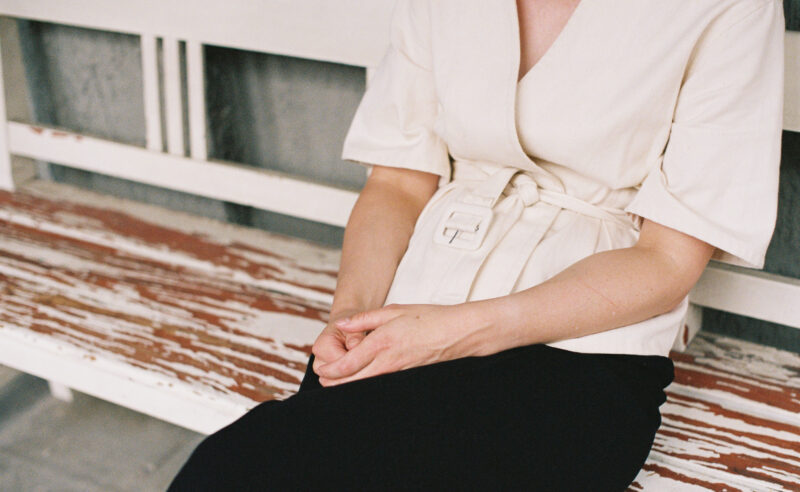
Inside the Philosophy of Draft
Standstill: If there is such a thing as free will, I guess you could say we are volunteering. What are your views on free will? Do we need to believe in free will to be creative? And to be hopeful? Can there be creativity in determinism?
“I don’t know if free will exist. I do experience it like that. I’m not sure you have to believe in it in order to experience. To me there is creativity even in a deterministic world but, even though I experience it like this, I’m not sure if it’s me pulling all the strings.”
You said Stopwatch is about the woman you would want to be. Did / how did the image of the woman you want to be change after writing the song? What kind of relationship do you have to her?
“I think the woman in Stopwatch is all things good and bad. It’s an accepting image of a woman. More acceptive than I am from time to time. So, what I think the song did help me to have is less expectations. And see the self more as a fluid thing. Like a constant draft that’s ever changing. I think we can really get stuck in being the thing we describe ourselves to be. Stopwatch is trying to describe everything, the contradictions of being.”
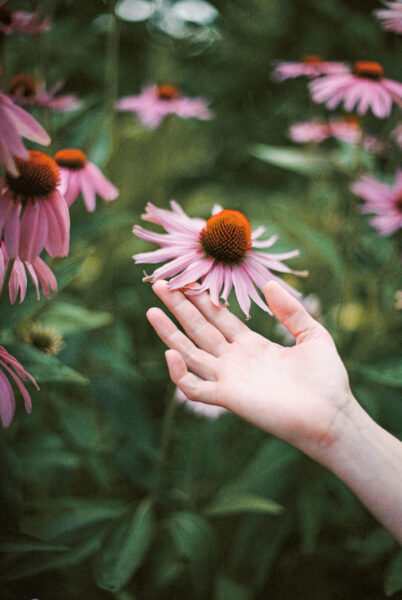
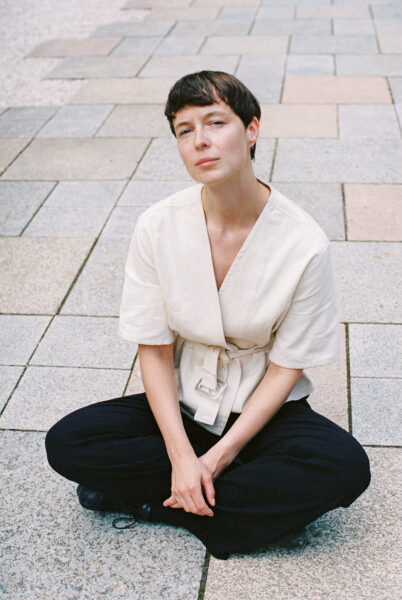
Questions, Answers and Hope
Draft is a recording embracing the philosophy of the unfinished and the processual quality of any creative work. It is a record that asks questions without answering them, knowing that sometimes we do not need the answer but what we really need is to ask the question itself. “To me”, the artist says, “making music is the question. I recently heard and architect on Dutch TV say that science is questioning what we think we know for sure, and art is being sure of what we question. I like that.”
“Creating is always about hope” you said. Yet sometimes it seems as if in the most hopeless moments people turn to art, so many songs are about the feeling of hopelessness. Where do you see the hope in that? Is there hope, even in the most hopeless songs?
“I think so. I always feel a song is written to give a certain feeling a name, to describe it. To contain it for a bit or to be able to reach out with it. I’m so glad people wrote sad music. It makes me feel heard when I understand what they are singing, when I feel what they are playing. And I think a song is never written because we don’t want it to exist. Isn’t there always a little bit of hope in that.”
Authenticity
Can you still call the first piece of art authentically you? Authentic you wrote the last record but that is probably a different authentic you that wrote this one.
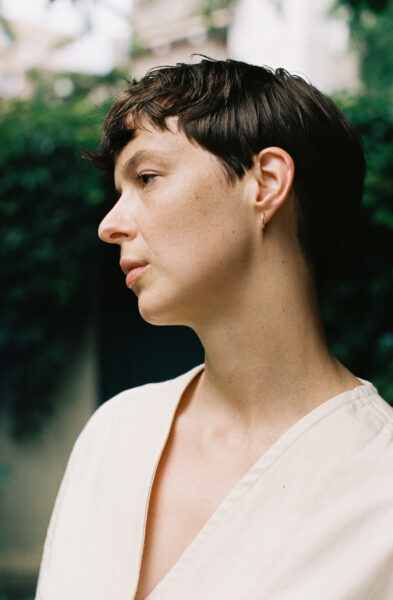 “Authenticity is another core theme of the record. To me authenticity is an interesting concept because it appears to be so momentary and cannot really be pinned down. In one moment, I could authentically express myself through a work of art that later, I do not resonate with at all anymore. If I then were to create something authentic, it would be something else entirely. Yeah I love that. It’s such a strange concept, like a game we play. We do perceive things to be authentic that are not and the other way around. But if I would describe what it means to me I think it would be just being without having to think about it.”
“Authenticity is another core theme of the record. To me authenticity is an interesting concept because it appears to be so momentary and cannot really be pinned down. In one moment, I could authentically express myself through a work of art that later, I do not resonate with at all anymore. If I then were to create something authentic, it would be something else entirely. Yeah I love that. It’s such a strange concept, like a game we play. We do perceive things to be authentic that are not and the other way around. But if I would describe what it means to me I think it would be just being without having to think about it.”
Do you believe in a constant personal identity, or do you feel like we manifest ourselves anew every day, evolving and changing with our surrounding?
“The first version of a song for example has something special. It’s like when you record a voice memo for a friend. The first version is you just talking. Then when you delete it and start again you start to clean up your message. You think about how you want to present yourself. I don’t think it’s a different authentic, but it might be a different version of yourself. I don’t believe in a constant identity, I feel like we’re ongoing.”
Music as Self-Exploration
As the in-depth reflection of the content of each song shows – music to LUWTEN is a highly personal affair. “I love the idea of music as self-exploration. For the maker as well as for the listener,” she says. It is music that feeds both, the heart and the mind, posing universal questions through personal reflections and mending the soul with mediative textures of synthesizers and collective vocal layers.
Tessa Douwstra writes music guided by empathy it seems – empathy for herself, the own emotions, confusions, and mishaps – as well as empathy and acceptance for the listener’s personal struggles. Part of this openness and welcoming vibe of the music might come from LUWTEN’s musical philosophy. Draft is a finished record but an unfinished piece of art. It is ever-changing, depending on who is listening and who is playing. It melts into the momentary state of your life, the outer and most inward corners, and bends to be exactly the record you need at that very moment in time.
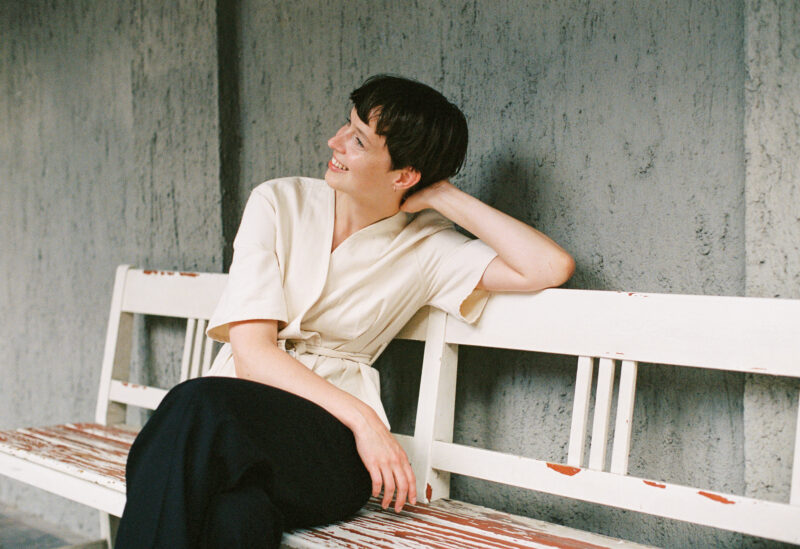
“The album title came from the word draft in a broader sense. It also means wind, the wind that’s coming into your room, underneath the door. Draft, as in sketch, does make you think about what a finished product is. When we zoom out all things can still be drafts, it just depends on how long it is going to exist. But for music, I think it is important to finish it in a form. To have something to come back to and to share in a physical form. If we wouldn’t do that it would never exist in that way. On stage it will always be changing.”
All Photos by Liv Toerkell for Nothing But Hope and Passion.
Draft is out now via Double For Me Recordings via Glassnote Records.



